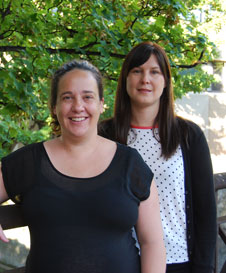
O-zone co-convenors Dr Sian Halcrow and Dr Dione Healey.
Just a short time into their tenure as co-convenors of Otago's O-zone Research Group, senior lecturers Sian Halcrow (Department of Anatomy) and Dione Healey (Department of Psychology) have already begun laying the foundations to raise the group's profile and improve support for early-career researchers (ECR) at Otago.
The O-zone Group was the brainchild of Professor Geoffrey White during his time as Deputy Vice-Chancellor, Research and Enterprise says Dr Healey.
“His idea was for the group to showcase the research being conducted by Otago's leading early career researchers and for these researchers to both promote research and lobby for the interests of early career researchers in order to better our research environment.”
Dr Halcrow says there can be many challenges facing researchers in their early careers.
“Securing and maintaining an early career position at any tertiary institution is a very difficult and competitive task. At present there are over 1300 students undertaking PhDs at the University of Otago, but only a very small number of postdoctoral and lectureship positions available in New Zealand.”
According to Dr Halcrow, the challenges don't end once a position has been secured.
“The current funding climate is making it more and more difficult to gain external research funding, through avenues including the Royal Society of New Zealand Marsden Fund and the Health Research Council of New Zealand, which can be very stressful for new academics.
“New staff also have the very time consuming tasks of setting up their research groups and for some research areas physical laboratories. There is also the significant amount of time it takes to prepare for teaching into new papers and/or developing new papers, as well as learning the ropes in administrative tasks.”
While membership to O-zone is limited to recent winners of either an Early Career Award for Distinction in Research or a Rowheath Trust Award and Carl Smith Medal, its newest convenors (themselves winners of Early Career Awards – Dr Healey in 2011 and Dr Halcrow in 2012) want to emphasise that the group exists to support all ECRs at Otago.
“This year we are very keen to hear from all early career staff (not just O-zone members) so that we best represent the key issues facing ECRs as a whole. Thus we strongly encourage ECRs at Otago to make contact with us to let us know what types of things they would like us to try and remedy.”
Over the next two years, Drs Halcrow and Healey hope to build on the legacy of past convenors and draw on the collective expertise of the group's own membership to help smooth the way for current and future ECRs.
“This year we are focusing on developing two main themes or issues that are of most relevance to ECR at the University; and will then work to try and raise awareness and hopefully solve or improve these issues,” says Dr Healey.
A visit to parliament later in the year is also being planned in order to showcase research being conducted by O-zone members at Otago, as well as discuss with current politicians across the political parties, best ways to support ECRs at a national and government level.
About O-zone
Each year, O-zone undertakes activities to promote interdisciplinary thinking and collaborations and to present a positive, clear, innovative and independent voice for research within the University, locally, regionally, and nationally.
O-zone members are winners of either an Early Career Award for Distinction in Research or the prestigious Rowheath Trust Award and Carl Smith Medal. In order to maintain its focus on early career researchers, award winners remain members of the group for a five-year term. Convenorship of the group is generally rotated biennially; and shared across two current O-zone members, elected by the group.
